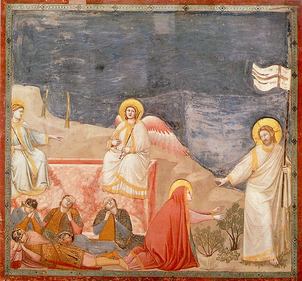
Sermon by St. Gregory the Pope
Mary Magdalene, the woman of the city who was a sinner, through love of the truth, washed away by her tears the befoulment of her sin; and thereby the word of the Truth was fulfilled which he spake: Her sins, which are many, are forgiven: for she loved much. She that had remained cold while she sinned, became burning when she loved. And so Mary Magdalene, after that she had been to the sepulchre, and had not found there the body of the Lord (wherefrom she was led to believe that it had been taken away), went out and told his disciples; and they came and saw, and thought it was even as she said. So it is written: Then the disciples went away again unto their own home. But of her it is said: Mary stood without, at the sepulchre, weeping.
In connection with this matter, we ought to ponder on this, namely, the great store of love which was in that woman's heart. For she, when even his disciples were gone away, could not tear herself from the grave of the Lord. She sought him whom she had not found there, and as she sought, she wept. And the fire of love in her heart yearned after him, who (as she believed) had been taken away. And so it came to pass that she, who had lingered to seek him, was the only one who then saw him. For the backbone of a good work is endurance, and the voice of the Truth itself hath said: He that endureth to the end shall be saved.
As Mary wept there, she stooped down and looked into the sepulchre. It was but a little while since she had seen that the sepulchre was empty, and had declared that the Lord was taken away. Why then should she stoop down and look in again? It was because she loved him so well, that one look was not enough; the energy of her affection constrained her to search again and again. She began by searching and not finding; but she endured in her search, and behold, it came to pass that she found. And this was done that our own longings for Christ's presence might be taught to expand; and that we might know how, that as they expand, they will meet with him to whom they aspire.





